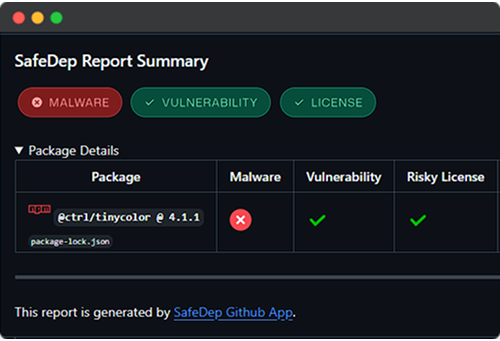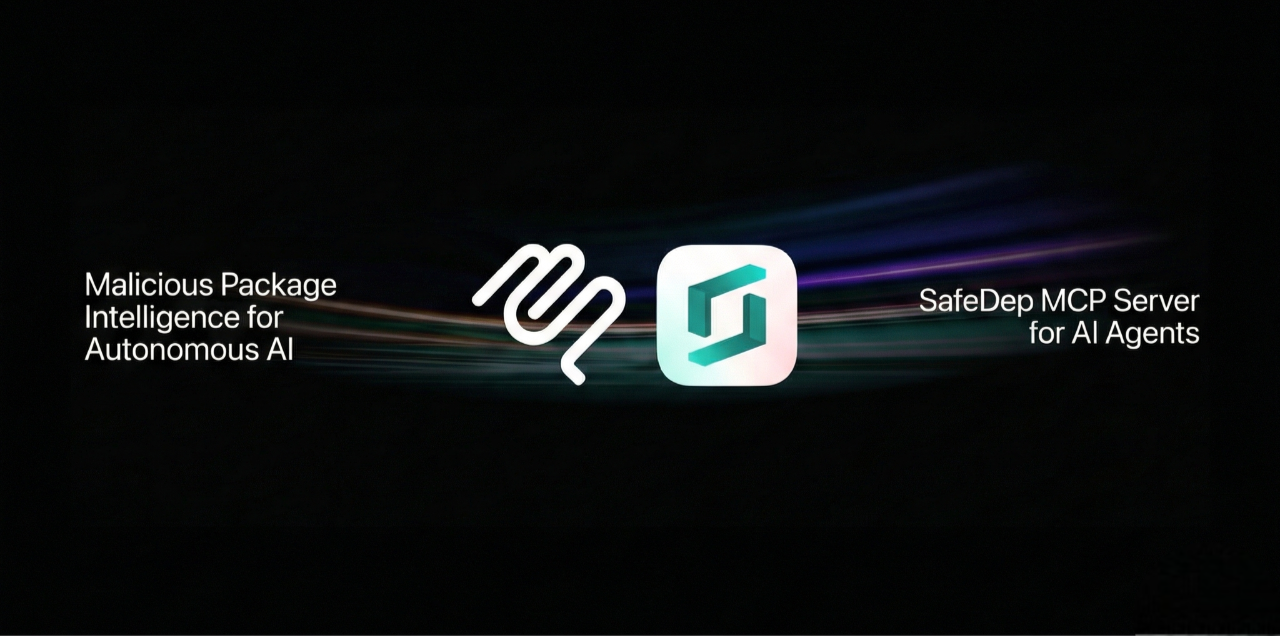Ship Code. Not Malware. SafeDep Launches GitHub App for Malicious Package Protection
Table of Contents
Malicious Package in the Wild
The recent supply chain attack targeting the npm ecosystem, such as the Shai-Hulud and the S1ngularity campaign, has raised serious concerns among the developer and security engineering community. Detecting malicious code in open source packages is a complex problem, and it requires a multi-layered approach. We have been doing this for a while leveraging:
While we handle the complexity, we have always strived to provide the simplest and minimally intrusive solution to protect developers from malicious packages. So we launched SafeDep GitHub App to make it ridiculously simple to protect your code repositories from malicious packages.
Installation is simple and zero configuration - Install Now
Zero Configuration Malicious Package Protection
How To Get Started?
- Install the SafeDep GitHub App
- Wait for the next pull request to be scanned
- Stay protected from malicious packages
That’s it! It is really that simple. Here is how it looks like in action:

How it works?
SafeDep scans all open source packages released to supported registries such as npm, PyPI, RubyGems, Cargo and more. SafeDep applies static, dynamic and agentic analysis to detect malicious packages. While these packages are removed from the registries, SafeDep tools leverage this threat intelligence to protect code repositories from malicious packages.
What are the benefits?
- Zero Configuration: Install the app with zero configuration
- Real-time Protection: Scans every pull request for malicious packages
- Multi-Ecosystem: Supports npm, pnpm, yarn, and more
- Multi-Language: Supports JavaScript, TypeScript, Python, and more
- Multi-Platform: Supports Windows, Linux, and macOS
Documentation and Support
- GitHub App Documentation: SafeDep GitHub App
- Community support: https://docs.safedep.io/community
- npm
- oss
- malware
- supply-chain
Author
SafeDep Team
safedep.io
Share
The Latest from SafeDep blogs
Follow for the latest updates and insights on open source security & engineering

npm SANDWORM_MODE Attack: Step-by-Step Malware Analysis
Step-by-step technical analysis of the SANDWORM_MODE npm supply chain attack. We dissect yarsg and format-defaults malicious packages, decode multi-layer obfuscation, and trace the payload delivery...

Why We Built a Hosted MCP Server to Stop Malicious Packages for AI Agents
Exposing an MCP server is trivial. Making it useful for AI agents is not. Here's what we learned dogfooding our own tool, and why we built a hosted MCP server backed by real-time open source threat...

AI Agent Cline v2.3.0 Compromised: From Prompt Injection to Unauthorized npm Publish
A compromised npm token was used to publish a tampered version of Cline CLI. A prompt injection vulnerability in Cline's AI-powered GitHub Actions workflow may have enabled the credential theft.

End-to-End test with Nextjs, Playwright and MSW
A practical Next.js 16 App Router E2E setup with Playwright and MSW that keeps server-side fetch deterministic by focusing mocking where it matters, not on server actions.

Ship Code
Not Malware
Install the SafeDep GitHub App to keep malicious packages out of your repos.
